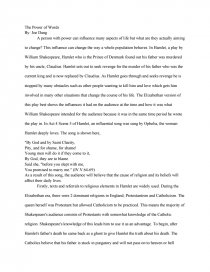The Power of Words - Hamlet Essay
Essay by jdang1614 • December 8, 2011 • Essay • 582 Words (3 Pages) • 2,764 Views
The Power of Words
By: Joe Dang
A person with power can influence many aspects of life but what are they actually aiming to change? This influence can change the way a whole population behaves. In Hamlet, a play by William Shakespeare, Hamlet who is the Prince of Denmark found out his father was murdered by his uncle, Claudius. Hamlet sets out to seek revenge for the murder of his father who was the current king and is now replaced by Claudius. As Hamlet goes through and seeks revenge he is stopped by many obstacles such as other people wanting to kill him and love which gets him involved in many other situations that change the course of his life. The Elizabethan version of this play best shows the influences it had on the audience at the time and how it was what William Shakespeare intended for the audience because it was in the same time period he wrote the play in. In Act 4 Scene 5 of Hamlet, an influential song was sung by Ophelia, the woman Hamlet deeply loves. The song is shown here,
"By God and by Saint Charity,
Pity, and for shame, for shame!
Young men will do it if they come to it,
By God, they are to blame.
Said she, "before you slept with me,
You promised to marry me." (IV.V.64-69)
As a result of this song, the audience will believe that the cause of religion and its beliefs will affect their daily lives.
Firstly, texts and referrals to religious elements in Hamlet are widely used. During the Elizabethan era, there were 2 dominant religions in England; Protestantism and Catholicism. The queen herself was Protestant but allowed Catholicism to be practiced. This means the majority of Shakespeare's audience consists of Protestants with somewhat knowledge of the Catholic religion. Shakespeare's knowledge of this leads him to use it as an advantage. To begin, after Hamlet's father's death he came back as a ghost to give Hamlet the truth about his death. The Catholics believe that his father is stuck in purgatory and will not pass on to heaven or hell unless revenge is accomplished where as the Protestants believe that purgatory does not exist. This is shown when the Ghost says, "Till the foul crimes done in my days of nature - Are burnt and purged away" (I.V.16-17). As a result, this technique affected the audience because it made them believe that the Ghost was only seeking revenge therefore the audience sympathised with Hamlet with his actions that lead up to the death of Claudius. In addition, the Protestant religion believes that all spirits are evil where as the Catholic religion believes that spirits can be good and evil. This is shown when Hamlet says, "Be
...
...

